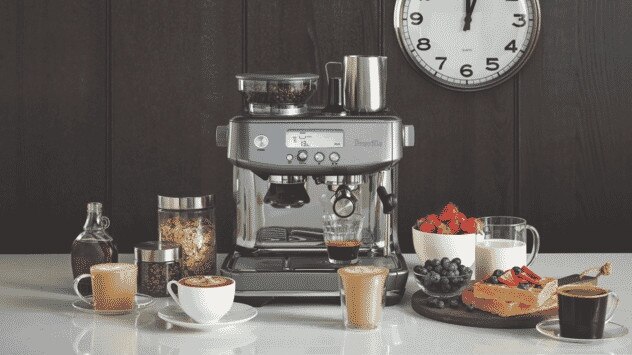Breville, which counts Solomon Lew’s Premier Investments as its top investor, facing pricing pressures after profit jumps 25pc
The kitchen appliances firm, which counts billionaire Solomon Lew as its top shareholder, delivers strong profit growth as consumers upgrade their coffee machines and juicers.

Consumers might soon pay more for their coffee machines, toasters or juicers after Breville boss Jim Clayton confirmed it was facing inflationary pressures, but stressed it would be done carefully to protect the group’s massive growth, driven by people upgrading their kitchen appliances.
Breville was also encountering supply chain constraints, especially at the key US port in Los Angeles which had left its products stuck on the ship and unable to be sent to customers with that holding back some sales into the American market.
The famous Australian brand, known for its coffee machines, toasters and sandwich makers, didn’t suffer greatly however from supply chain disruptions or a first round of price rises pushed through late last year to deal with higher inflation, and on Wednesday posted double-digit sales growth across its regions.
Breville – which counts billionaire retailer Solomon Lew’s retail business Premier Investments as its biggest shareholder with a stake of just under 26 per cent – booked a 25 per cent jump in interim profit to $77.7m as sales rose around 24 per cent to $878.7m.
The company reported sales growth across all its three key regions – the Americas, the Asia Pacific and Europe, Middle East and Africa – with that demand also spread across all its kitchen appliances categories.
It increased its interim dividend by 15 per cent to 15c a share, which will be paid on March 17.
Mr Clayton told The Australian that his customers were continuing to upgrade their kitchen appliances as many people work from home and they enjoy brewing up a homemade coffee machine or smoothie.
“Over the last two years we all got the opportunity to adjust to work from home. And then I think that’s got everyone focused on the quality of what they can do at home and I think that in a sense it has been one of the core drivers of our revenue … is people deciding to in a sense, to upgrade the quality of what they’re making at home and so forth, and we’ve certainly benefited from that realisation,” Mr Clayton said.
And it wasn’t just isolated to key products such as coffee machines or toasters.
“It is across the board. Within that construct, whatever is important to you, at home, having to do a lot more often now. This is where the interesting thing to me about the last couple of years is that we‘ve seen this happen across the entire range.
“It’s not just one thing or another. So it’s really whatever is important to the end customer to improve the quality of their outcomes at home. That’s what leads them to buy Breville products and because our innovation is all focused on improving outcomes at home. And I think that’s helped us succeed over the last couple of years.”
There were problems to tackle, with inflationary pressures feeding into the category and leading to Breville likely passing on some price increases in the second half.
“So in the first half, we put through what I would call single digit price increases on some products and some geographies. What we could do in the second half, not decided yet, but we could in the second half again, on a small group of products, put through some price increases, like ones that we didn’t do in the first half.”
But he said the small nature of Breville kitchen appliances meant higher container shipping and freight charges weren’t as punishing at a unit price level while the premium halo around the Breville brand would help defend its price position in the market.
“Because the problem is not as big for us as it is for most people, for most companies, it allows us to be very tactical and thoughtful with these (price rises). So it is possible that in the second half if the inflationary pressures continue from behind, yeah, we’ll find out soon enough, then we may move forward with another very specific products and specific markets based … we may end up with a kind of a single digit price increase on that product.”
Mr Clayton also said too much of Breville’s inventory remained as goods-in-transit as opposed to being in its warehouse with it primarily sitting on ships waiting to get into the L.A. port. This impacted its ability to completely satisfy consumer demand in the US.
To avoid a replay of these supply challenges in the first half of 2023, Breville’s aim in the second half of 2022 is to get in front of any future supply chain problems by accelerating its inventory build, he said.
Breville expects annual pre-tax earnings to be consistent with the markets’ current consensus forecast of around $156m.
Its shares were up 0.6 per cent at $28.63 on the ASX just before midday.




To join the conversation, please log in. Don't have an account? Register
Join the conversation, you are commenting as Logout